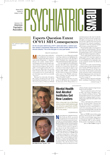A new report on mental health and mass violence developed by trauma experts suggests that some psychological interventions are ineffective and possibly even harmful to recipients in the long run.
“Some rigorous studies indicated that having an individual recite the traumatic events and associated thoughts and feelings did not prevent symptoms of posttraumatic stress disorder (PTSD) later on. In fact, some survivors appeared to have an increase of symptoms,” said Farris Tuma, Sc.D., chief of the Traumatic Stress Program at the National Institute of Mental Health (NIMH), in an interview with Psychiatric News.
Tuma participated in a workshop in Warrenton, Va., in October 2000 sponsored by the NIMH, U.S. departments of Defense, Justice, and Veterans Affairs, and the American Red Cross. The report was an outcome of the workshop, which drew more than 50 international and national mental health researchers and clinicians.
They reviewed the evidence for various early psychological interventions and drew some general conclusions. They also developed guidance on disaster preparation, planning, training, and evaluation of services.
The experts agreed that some cognitive-behavioral therapies, including cognitive restructuring, and brief psychotherapeutic interventions, including supportive counseling, given within one month of a disaster can prevent future psychological symptoms of trauma and distress.
“CBT in particular was rigorously and systematically studied in Australia. The outcomes showed fewer symptoms of acute stress disorder, PTSD, and in some cases depression than the comparison group,” said Lt. Col. Cameron Ritchie, a member of the Society of Uniformed Services Psychiatrists, in an interview. The society is a district branch of APA.
Ritchie is a principal author of the report and program director for mental health policy and women’s issues in the Office of the Assistant Secretary of Defense, Clinical and Program Policy, in Falls Church, Va.
She urged psychiatrists and mental health professionals to avoid using a one-size-fits-all approach when they intervene in disasters. “All too often, we rush in like superman without adequate preparation including training, knowledge, and collaboration,” said Ritchie.
The report provides a timeline for mental health interventions in an appendix. For example, during the impact phase within 48 hours of a disaster, clinicians should address survivors’ basic needs, including food and shelter, and facilitate communication with their family, friends, and community, according to the report.
During the first week after a disaster, which is the rescue phase, mental health workers should assess individuals clinically and refer people identified as high risk to local psychiatrists and mental health professionals who can provide intensive treatment, said Tuma.
These clinicians “should not do a one-time intervention without having a referral system in place for follow-up sessions,” said Ritchie.
From two weeks to two years after a traumatic incident, the role of psychiatrists and mental health professionals is to reduce or improve symptoms and functioning through treatments that include therapy, medication, and short- and long-term hospitalization, the report stated.
Tuma hopes that the report, which is being distributed to the sponsoring agencies and interested organizations, will be read widely and incorporated into disaster policies and procedures to improve planning for future disasters.
The report “Mental Health and Mass Violence: Evidence-Based Early Psychological Intervention for Victims/Survivors of Mass Violence” is posted on the Web at www.nimh.nih.gov/research/massviolence.pdf. Single copies of the report can be ordered through the NIMH Office of Communications and Public Liaison at (301) 443-9663. ▪

